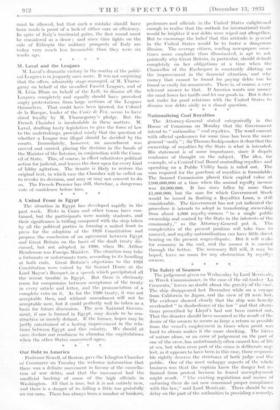Our Debt to America .
Professor Newell, of-Boston, gave the Islington Chamber of Commerce on Tuesday the welcome • information 'that there was a definite movement in favour of the cancella- tion- of war debts, and that the movement had the unofficial backing of some of - the high officials in Washington. All that is true, but it not entirely new, and there is a danger of -its-falling a little -too gratefully on our ears. There has always been a• number of bankers; professors and officials in the United. States .ailikhfenesl enough to. realise that the outlook for international trade would be brighter if war debts were wiped but' altogether. But to encourage- the belief that this attitude is' general in 'the United States -would be to foster a 'dangeriius illusion. The average citizen, reading newspapers some- times more emphatic than illuminated, is apt to ask pointedly why Great Britain, in particular, should default completely on her obligations at a time when the Chancellor of the Exchequer is constantly dilating on the improvement in the financial situation,' and \Illy money that cannot be found for paying debts be found so easily for armaments. There is, of course, a very relevant answer to that. If America wants our money she must lower her tariffs and let our goods in. But it does not make for good- relations with the United -States to dismiss war debts airily as a closed question. •














































 Previous page
Previous page